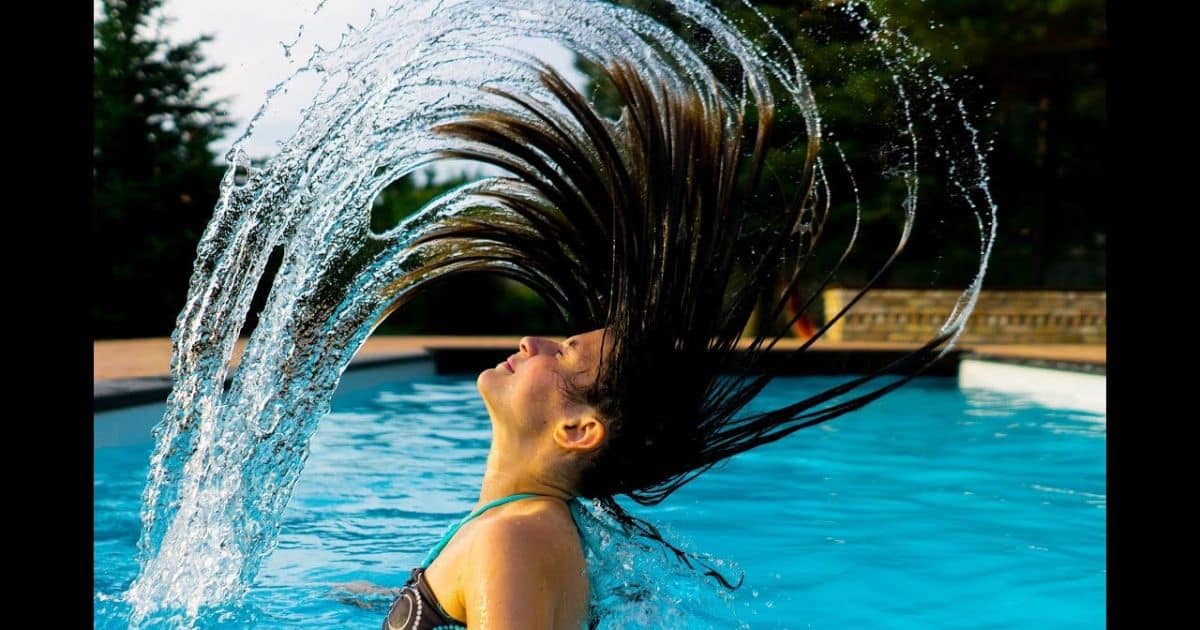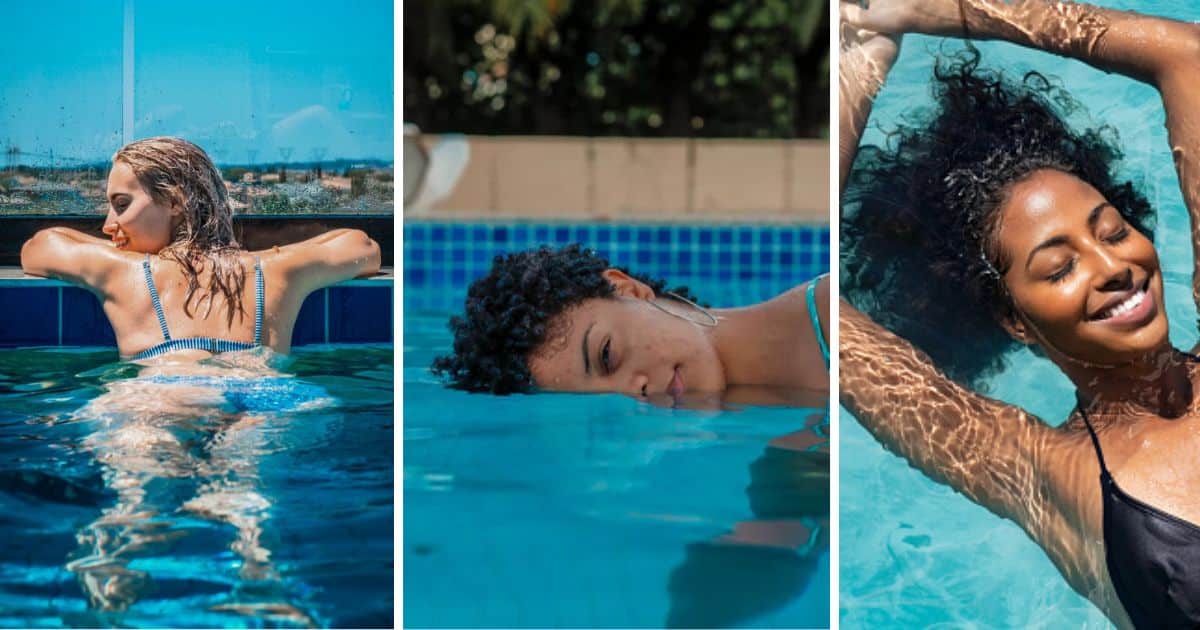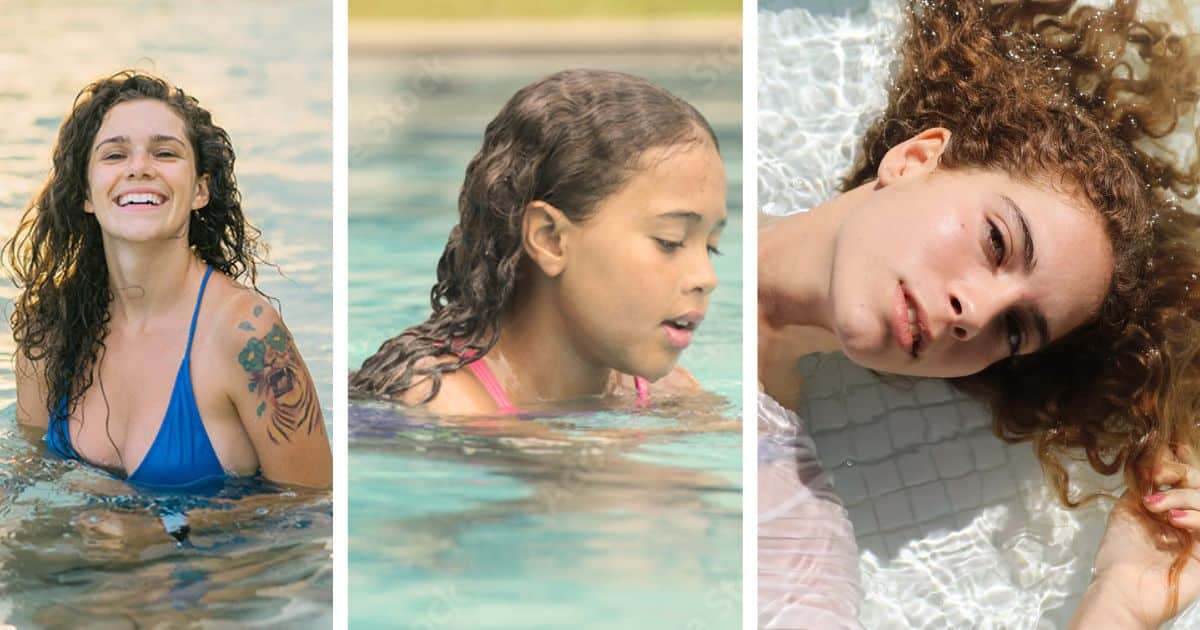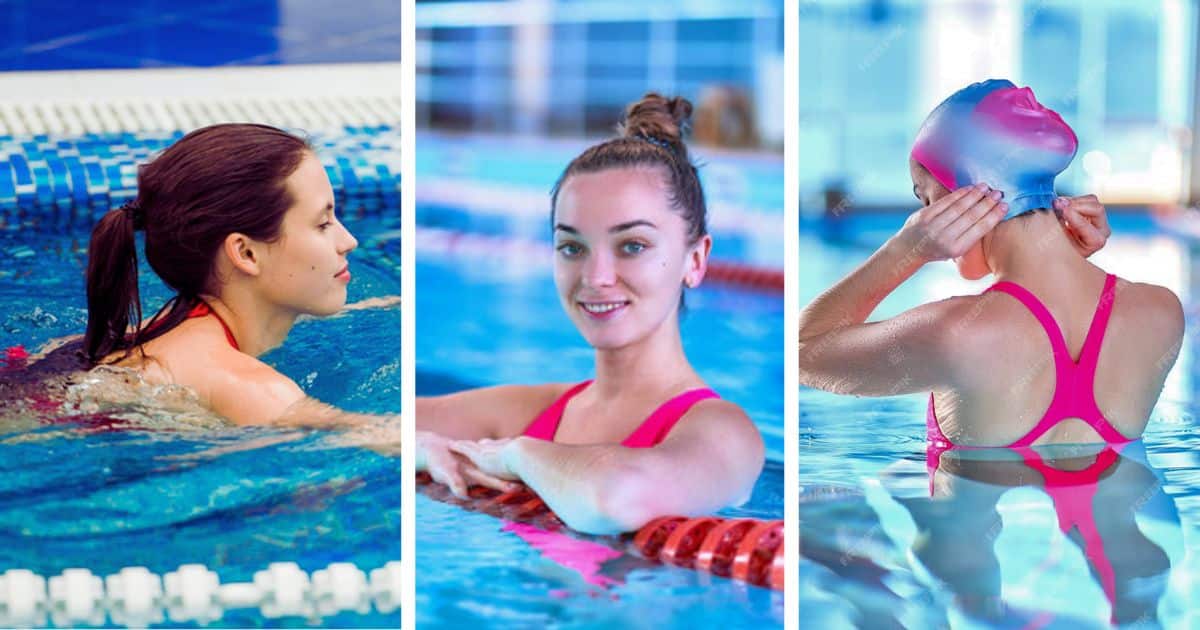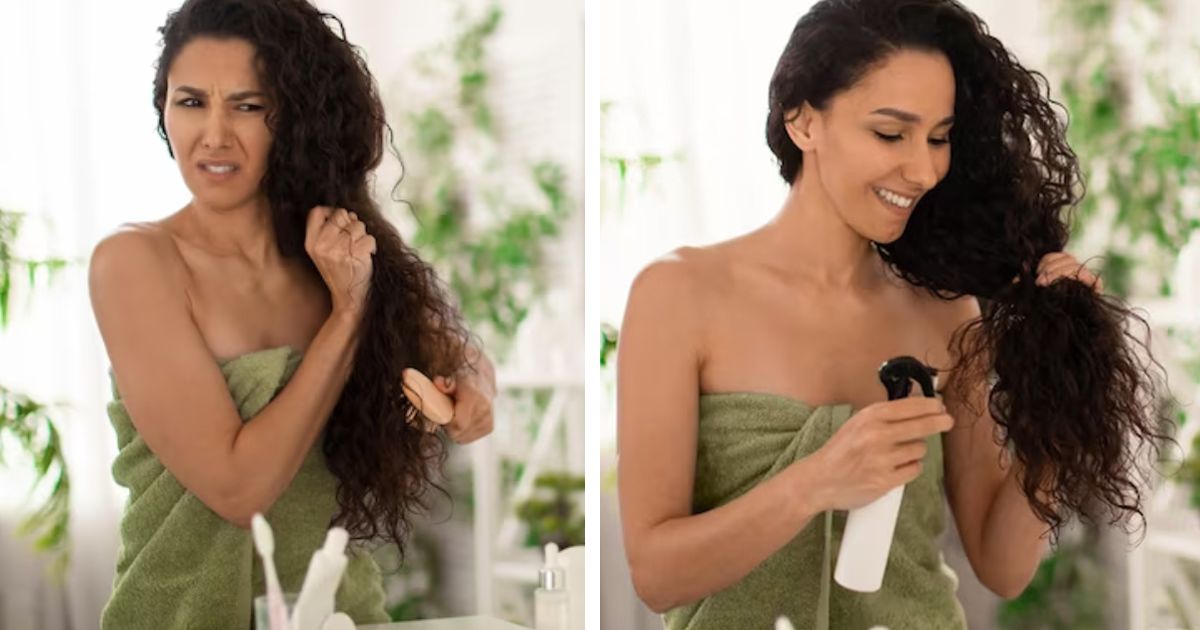Dive into the fascinating realm where pool water and hair texture intertwine, revealing the scientific secrets behind the enigmatic phenomenon of curly hair. Discover how the presence of chlorine in pool water interacts with hair proteins, altering its natural state. Unravel the role of pH levels in this transformative process and explore effective strategies to protect your locks from the clutches of chlorinated waters. Let us debunk common myths and empower you to embrace your curly hair with confidence after a refreshing swim.
Key Takeaways
- Curly hair has overlapping cuticle layers and increased porosity, making it more prone to absorbing pool water.
- Pool water contains chlorine and other chemicals that strip away natural oils from the hair, causing dryness, frizziness, and brittleness.
- Chlorine interacts with hair proteins, making them weak and contributing to the curly texture of the hair.
- pH levels of pool water can affect the hair’s cuticle, leading to frizz and increased porosity. Taking preventive measures such as wetting hair before swimming, using a swim cap, and rinsing hair thoroughly can help minimize pool-induced hair damage.
The Science Behind Pool Water and Curly Hair
The interaction between pool water and curly hair can be explained through the science of hydrophilic properties and hair structure. Curly hair has a unique structure with overlapping cuticle layers, making it more prone to water absorption.
Pool water contains chlorine and other chemicals that strip away natural oils from the hair, causing it to become drier and more porous. This increased porosity allows the hair to absorb more water, leading to the temporary change in its shape and texture.
The Effects of Chlorine on Hair Texture
Chlorine, a common chemical found in pool water, can significantly alter the texture of hair. When hair comes into contact with chlorine, it strips away the natural oils that keep hair moisturized and smooth. This leads to dryness, frizziness, and brittleness. Additionally, chlorine can penetrate the hair shaft, causing it to swell and become porous.
As a result, hair may appear dull, lack shine, and become more prone to breakage. Understanding the effects of chlorine on hair texture is crucial for individuals who desire healthy, vibrant hair even after swimming in chlorinated pools.
How Chlorine Interacts With Hair Proteins
- When exposed to pool water, chlorine interacts with hair proteins, resulting in changes to the hair’s structure and texture.
- Chlorine molecules attach to the hair proteins, causing them to become brittle and weak.
- This interaction disrupts the hydrogen bonds that hold the hair’s shape, leading to frizz and curl formation.
- The chlorine also strips away the natural oils from the hair, leaving it dry and more susceptible to damage.
- The damaged proteins can cause the hair shaft to become rough, further contributing to the curly texture.
- The intensity of the interaction depends on the concentration of chlorine and exposure time.
Understanding how chlorine interacts with hair proteins is crucial in comprehending why pool water makes hair curly. However, it is not the only factor at play. The role of pH levels in the hair’s curly transformation will be explored in the next section.
The Role of Ph Levels in Hair Curly Transformation
To further understand the curly transformation of hair in pool water, it is important to examine the influence of pH levels on the hair’s structure and texture. The pH of pool water can range from acidic to alkaline, and this can affect the hair’s cuticle, the outermost protective layer.
When the pH is too high or too low, the cuticle can become raised or damaged, leading to frizz and increased porosity. Understanding pH levels is crucial in preventing pool-induced hair woes.
Preventing Pool-Induced Hair Woes
Pool water can be damaging to hair, so it is important to take preventative measures to avoid pool-induced hair woes. Here are some tips to protect your hair while swimming:
- Wet your hair with tap water before entering the pool to minimize chlorine absorption.
- Use a swim cap to create a barrier between your hair and the water.
- Apply a leave-in conditioner or oil to coat your hair and protect it from chlorine damage.
- Rinse your hair thoroughly with fresh water immediately after swimming.
- Use a clarifying shampoo once a week to remove any chlorine buildup.
Best Practices for Protecting Hair From Chlorine
When protecting your hair from chlorine, it is essential to adopt best practices to maintain its health and prevent damage. Before entering the pool, wet your hair with fresh water to minimize chlorine absorption. Apply a leave-in conditioner or hair oil to create a protective barrier. Wear a swimming cap to reduce chlorine contact.
After swimming, rinse your hair thoroughly with clean water and use a clarifying shampoo to remove chlorine buildup. Conditioning treatments can help restore moisture and prevent dryness.
Tips for Minimizing the Effects of Pool Water on Hair
After taking the necessary precautions to protect your hair from chlorine, it is important to follow additional tips for minimizing the effects of pool water on your hair. Here are some helpful tips to keep in mind:
- Wet your hair with clean water before entering the pool to minimize absorption of chlorine.
- Apply a leave-in conditioner or oil to create a barrier between your hair and the pool water.
- Wear a swim cap to protect your hair from direct contact with chlorine.
- Rinse your hair immediately after swimming to remove any lingering chlorine residue.
- Use a clarifying shampoo once a week to remove chlorine buildup.
Repairing and Restoring Curly Hair Post-Swim
To effectively restore and repair curly hair after swimming, it is essential to address the damage caused by exposure to pool water. Chlorine and other chemicals in the water can strip the hair of its natural oils, leading to dryness and frizz.
It is recommended to use a clarifying shampoo to remove any residue and follow up with a deep conditioning treatment. Additionally, using a wide-toothed comb or your fingers to detangle the hair gently can prevent further breakage.
Common Myths About Chlorine and Hair
One misconception commonly associated with the effects of chlorine on hair is the belief that it is solely responsible for making hair curly. While chlorine can affect the texture and appearance of hair, there are other factors at play. Here are some common myths about chlorine and hair:
- Chlorine turns hair green.
- Chlorine causes hair to become dry and brittle.
- Chlorine strips hair of its natural oils.
- Chlorine is the main cause of hair damage in pools.
- Chlorine can be completely removed from hair with shampoo.
Final Thoughts: Embracing Your Curly Hair After a Swim
Continuing the discussion from the previous subtopic, it is important to embrace and care for your curly hair after swimming in pool water. Chlorine and other chemicals in pool water can cause dryness and damage to your hair, especially if it is naturally curly.
To maintain the health and beauty of your curls, it is crucial to follow a post-swim hair care routine. Here are some tips to help you embrace and care for your curly hair after a swim:
| Tips for Embracing Your Curly Hair After a Swim |
|---|
| 1. Rinse with clean water to remove chlorine residue. |
| 2. Use a sulfate-free shampoo and conditioner specifically formulated for curly hair. |
| 3. Apply a leave-in conditioner to moisturize and detangle your curls. |
| 4. Avoid using heat styling tools and let your hair air dry. |
| 5. Embrace your natural curls and avoid excessive brushing or combing. |
Frequently Asked Questions
How Often Should I Wash My Hair After Swimming in a Pool?
It is recommended to wash your hair after swimming in a pool to remove any chlorine or other chemicals that can cause damage. The frequency of washing may vary depending on individual factors such as hair type and condition.
Can Using a Swim Cap Prevent My Hair From Becoming Curly After Swimming?
Using a swim cap may reduce the amount of pool water that comes in contact with your hair, potentially minimizing the curly effect. However, it is important to note that other factors, such as the chemicals in the pool water, can also contribute to hair curling.
Are There Any Specific Hair Care Products I Should Use to Protect My Hair From Chlorine?
To protect your hair from chlorine, use hair care products specifically designed to remove chlorine and restore moisture. Look for products with ingredients like vitamin C and aloe vera, which can help minimize the damaging effects of chlorine on your hair.
Does the Length of Time Spent in the Pool Affect the Level of Hair Damage?
The length of time spent in the pool can indeed affect the level of hair damage. Prolonged exposure to chlorine and other chemicals in pool water can strip the hair of its natural oils, leading to dryness, brittleness, and increased risk of breakage.
Can Swimming in Saltwater Pools Have the Same Effect on Hair as Chlorinated Pools?
Swimming in saltwater pools can have similar effects on hair as swimming in chlorinated pools. The high salt content in the water can cause the hair to become dry and brittle, leading to increased chances of hair damage and possibly curly hair.
Conclusion
In conclusion, the interaction between pool water and curly hair is a result of the effects of chlorine on hair texture and its interaction with hair proteins. The pH levels of pool water also play a role in transforming hair texture. While there are ways to prevent and minimize the negative effects of pool water on curly hair, it is important to embrace and care for your natural curls. Don’t let common myths about chlorine and hair deter you from enjoying a swim.
